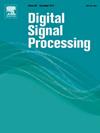Multi-scale compression artifact attention-driven compressed video quality enhancement
IF 2.9
3区 工程技术
Q2 ENGINEERING, ELECTRICAL & ELECTRONIC
引用次数: 0
Abstract
Compressed video quality enhancement is crucial for mitigating artifacts introduced by video coding. Video compression often results in unevenly distributed artifacts across different regions of video frames, leading to significant quality variations. Existing algorithms treat all regions uniformly, ignoring these localized differences, limiting their ability to extract high-quality information from reference frames and accurately reconstruct residuals. Additionally, larger temporal gaps between reference and target frames can cause alignment errors, which propagate during fusion and degrade performance. To address these challenges, we propose a Multi-scale Compression Artifact Attention (MSCAA) module that captures artifact distribution, guiding the model to focus on distorted regions. We also introduce a Progressive Fusion Stage that sequentially fuses reference frames based on temporal proximity, reducing error propagation and enhancing temporal coherence. The experimental results show that the proposed method improves average ΔPSNR by 5.15% and ΔSSIM by 3.35% compared to the state-of-the-art method, demonstrating its superior performance in quality enhancement.
求助全文
约1分钟内获得全文
求助全文
来源期刊

Digital Signal Processing
工程技术-工程:电子与电气
CiteScore
5.30
自引率
17.20%
发文量
435
审稿时长
66 days
期刊介绍:
Digital Signal Processing: A Review Journal is one of the oldest and most established journals in the field of signal processing yet it aims to be the most innovative. The Journal invites top quality research articles at the frontiers of research in all aspects of signal processing. Our objective is to provide a platform for the publication of ground-breaking research in signal processing with both academic and industrial appeal.
The journal has a special emphasis on statistical signal processing methodology such as Bayesian signal processing, and encourages articles on emerging applications of signal processing such as:
• big data• machine learning• internet of things• information security• systems biology and computational biology,• financial time series analysis,• autonomous vehicles,• quantum computing,• neuromorphic engineering,• human-computer interaction and intelligent user interfaces,• environmental signal processing,• geophysical signal processing including seismic signal processing,• chemioinformatics and bioinformatics,• audio, visual and performance arts,• disaster management and prevention,• renewable energy,
 求助内容:
求助内容: 应助结果提醒方式:
应助结果提醒方式:


